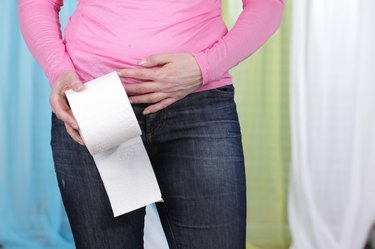
Loose, watery stools, or diarrhea, can often be associated with weight loss as the stools and fluid are lost. But unintentional and rapid weight gain can still happen even with diarrhea. Weight gain and diarrhea can be caused by many things, some of which overlap -- including some medical conditions that should be managed by a doctor. But, you can effectively deal with both weight gain and diarrhea.
Causes of Weight Gain and Loose Stools
Video of the Day
Celiac disease is a condition in which the digestive system can't handle gluten, an ingredient in many foods, including most breads, and even some medications. Many people with celiac disease suffer loose stools when they ingest gluten. Celiac disease causes malabsorption of nutrients, but may also cause sudden weight gain, says the National Digestive Diseases Information Clearinghouse. Eating excessive amounts of sugary and sweetened foods can also cause both weight gain and loose stools.
Video of the Day
Separate Causes of Weight Gain and Loose Stool
Weight gain and loose stools may also occur independently and be caused by unrelated factors, such as dietary changes, illness or health conditions. Drastically increasing your calorie intake can cause you to quickly put on unwanted pounds. A sudden and significant decrease in calories burned -- by stopping a rigorous exercise program -- can also cause your weight to increase. A number of medical conditions -- like thyroid problems, changes in metabolism and mental health problems like depression -- can also cause weight gain, according to MedlinePlus. An infection is a common cause of loose stools, and other causes include health conditions like celiac disease and inflammatory bowel disease, as well as intolerance to some foods, like milk. Diarrhea can also be a side effect of some medications, including laxatives, antibiotic medications and chemotherapy drugs, according to MedlinePlus.
Dealing With Weight Gain and Diarrhea
Make changes to your diet to help cope with both excess weight gain and loose stools. First, cut down on sugary foods and drinks in your diet. If you have celiac disease, avoid gluten. Add fiber to your diet as it can help keep you full without your consuming too many calories and can also help manage diarrhea and make stools firmer. Eat whole grain foods, fruits and vegetables to increase your fiber intake. Stick to low-calorie foods that won't aggravate your stomach. Plain toast, soups and applesauce can help ease your stomach without adding a lot of calories to your diet.
Managing Health Problems
If you have an irritable bowel disorder, celiac disease, lactose intolerance, thyroid problems or other health conditions, keep them under control to ease symptoms like weight gain and loose stools. You may need to make additional changes to your diet -- such as eliminating dairy foods, for example -- or medication regimen to better manage these symptoms.
Talking to Your Doctor
Talk to your doctor if you don't understand why you are gaining weight or suffering loose stools. A doctor may diagnose a medical condition and treat it. Simply making lifestyle changes will only help if these problems aren't related to an underlying condition.
Is this an emergency? If you are experiencing serious medical symptoms, please see the National Library of Medicine’s list of signs you need emergency medical attention or call 911.